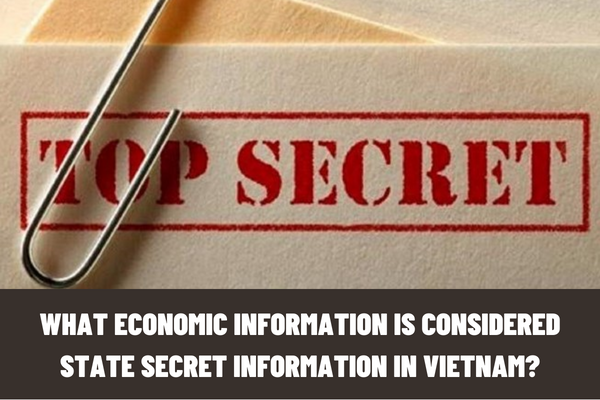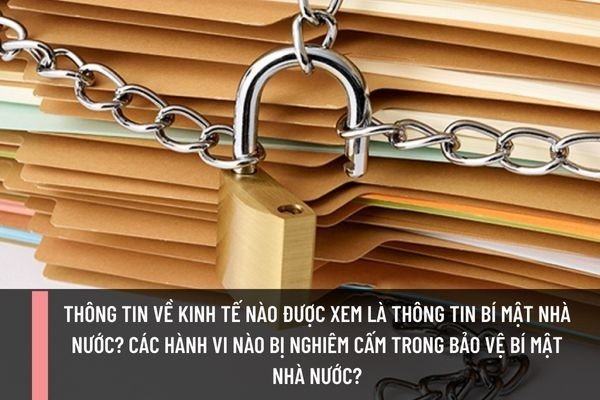What economic information is considered state secret information in Vietnam? What acts are prohibited in protection of state secrets in Vietnam?
What economic information is considered state secret information in Vietnam?
Pursuant to Clause 5, Article 7 of the 2018 Law on Protection of State Secrets in Vietnam stipulating that economic information on state secrets includes:
- National reserve and investment strategies and plans for national defense and security; bidding for the purpose of national security;
- Financial, budget and banking information; plans for collection, replacement and issuance of banknotes; specimen designs, engravings, molds and printing technologies for banknotes and financial instruments; quantity and storage of rare and precious metals, jewels and other precious objects of the State;
- Information about industry, commerce, agriculture and rural development;
- Transport plans of political, socio-economic, national defense and security importance;
- Information about formulation of national-level planning, regional planning, provincial planning, special administrative - economic unit planning, urban planning, rural planning; information about planning of the national reserve warehouse system, planning of systems of national defense construction works, military zones, ammunition warehouses, and the national defense and security industry;

What economic information is considered state secret information in Vietnam? What acts are prohibited in protection of state secrets in Vietnam? (Image from the Internet)
What levels are economic information classified?
Pursuant to Article 8 of the 2018 Law on Protection of State Secrets in Vietnam stipulating as follows:
Classification of state secrets
Based on the importance of their contents and scale of damage in case of divulgence or loss, state secrets are classified into the following 03 levels:
1. State secrets classified as “top secret” are those related to politics, national defense and security, cryptography and foreign affairs whose divulgence or loss can cause exceptionally grave damage to national interest;
2. State secrets classified as “secret” are those related to politics, national defense and security, cryptography, constitution formulation, legislation, judiciary, foreign affairs, economy, resources and the environment, science and technology, education and training, culture, sport, information and communications, healthcare, population, labor and social affairs, organizational structure and official affairs, inspection, supervision, handling of violations, settlement of complaints and denunciations, anti-corruption and state audit whose divulgence or loss can cause extremely grave damage to national interest;
3. State secrets classified as “confidential” are those related to politics, national defense and security, cryptography, constitution formulation, legislation, judiciary, foreign affairs, economy, resources and the environment, science and technology, education and training, culture, sports, information and communications, healthcare, population, labor and social affairs, organizational structure and official affairs, inspection, supervision, handling of violations, settlement of complaints and denunciation, anti-corruption and state audit whose divulgence or loss can cause grave damage to national interest.
Thus, economic information is classified as “secret” and “confidential”.
What acts are prohibited in protection of state secrets in Vietnam?
Pursuant to Article 5 of the 2018 Law on Protection of State Secrets in Vietnam stipulating that prohibited acts in protecting state secrets include:
- Divulgence, appropriation, selling and buying of state secrets; falsification and damage of state secret containers.
- Illegal collection, exchange, provision and transfer of state secrets; illegal copying, photographing, retention, transport, delivery, receipt, recall and destruction of state secret containers.
- Illegally taking state secret containers out of their storage.
- Exploitation or abuse of activities of state secrets protection or use of state secrets to conduct or conceal violations against regulations of laws, to commit violations of legitimate rights and interest or to obstruct operation of regulatory bodies, organizations or individuals.
- Creation or retention of a document containing state secrets in a computer or another device that has been or is being connected to the Internet, computer network or telecommunications network, excluding cases of state secrets retention regulated by cryptography laws.
- Uploading state secrets onto communications or telecommunications media against regulations of cryptography laws.
- Using a computer or another device that has been used to create, retain or exchange a state secret for another purpose before such state secret is removed.
- Use of a device capable of receiving and/or transmitting signals, recording or filming during a conference, seminar or meeting containing state secrets in any shape or form without permission from a competent person.
- Upload and distribution of state secrets on mass media, the Internet, computer network or telecommunications network.
LawNet
